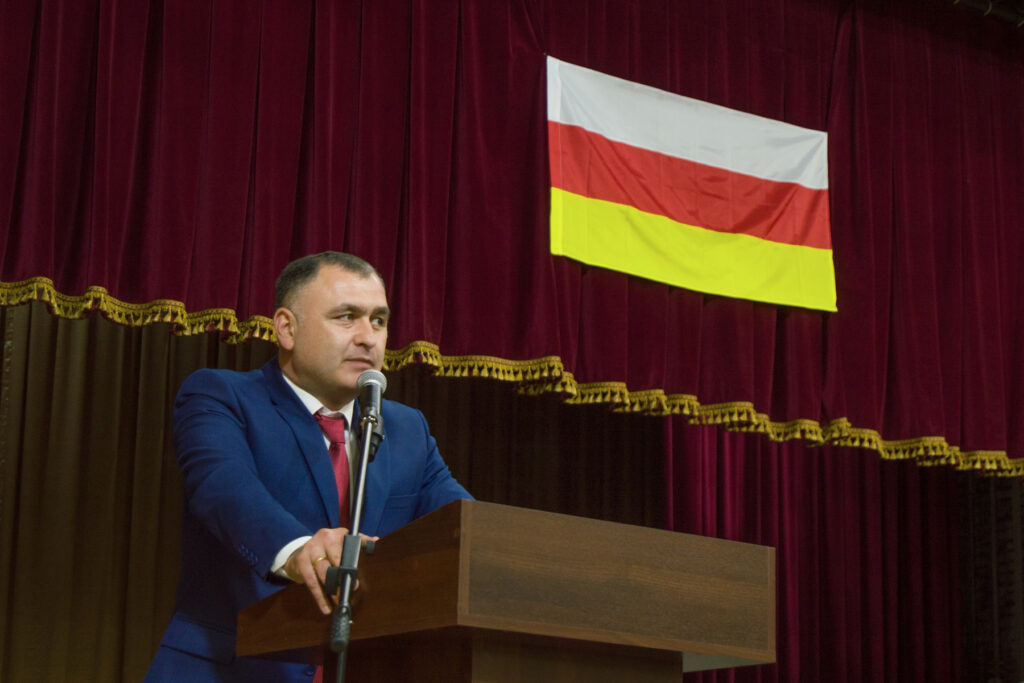Alan Gagloyev, chair of the opposition Nykhas party and former intelligence officer, has defeated incumbent President Anatoly Bibilov in South Ossetia’s presidential elections.
The second round of the presidential elections was held on Sunday. The Central Election Commission counted 97% of the votes so far — the incumbent president received 43% and Alan Gagloyev 54%.
Alan Gagloyev, 41-years-old, has led Nykhas since 2020. The party holds four out of 35 seats in the South Ossetian Parliament.
Gagloyev, then a former employee of the local KGB, first ran for president in 2017, though he failed to secure more than 10% of the vote.
According to South Ossetia’s Central Election Commission (CEC), voters cast their ballots in 76 polling stations in South Ossetia and others in Moscow, Sukhumi, and Vladikavkaz.
Emilia Gagiev, head of the CEC, said that the date of Gagloyev’s inauguration would take place five days after the official announcement of the election results sometime this week.
Bibilov conceded defeat and congratulated Gagloyev on his victory after the CEC counted only 18% of the votes.
‘For me, the choice of the people is beyond doubt. I keep my word, as I always have’, Bibilov said.
The first round of the presidential elections was held on 10 April. While none of the candidates surpassed the 50% threshold, Bibilov faced symbolic defeat by falling behind his rival by 4%.
On 9 May, Georgia condemned the second round of the elections, stating that it violates Georgia’s sovereignty and territorial integrity.
The unification of north and south
While all political groups in South Ossetia are ostensibly pro-Moscow and support the integration of the breakaway republic into Russia, Bibilov’s recent statements on holding a referendum on the annexation of South Ossetia by Russia were far from uniformly well-received.
[Read more on OC Media: South Ossetia to ‘take legal steps’ towards annexation by Russia]
Following the President’s statements, Gagloyev accused Bibilov of exploiting the question of reunification to strengthen his campaign. He also accused the incumbent President of putting the Russian leadership, which he said was focused on ‘more immediate issues these days’, in an awkward position.
On 20 April, Gagloyev entirely dismissed the referendum proposal alleging that South Ossetians had voted in favour of ‘reunification with North Ossetia within Russia’ as early as 1992.
Even after admitting defeat in the elections, Bibilov claimed that ‘there will be a referendum’ and that all documents had been collected and submitted to the CEC.
The road to the presidency
While the runoffs were initially slated for Thursday, 28 April, South Ossetia’s Supreme Court decided to cancel the second round of voting after agreeing with several plaintiffs who disputed that the elections should be held on a Sunday instead. On 26 April, the CEC pushed the date to 8 May.
Government critics have claimed that the plaintiffs were acting on Bibilov’s instructions, and accused the president of trying to buy more time before the second round. It was later revealed that all three plaintiffs were based in North Ossetia - Alania and had been granted South Ossetian citizenship shortly before mounting their legal challenge.
Bibilov further scrambled to turn the tide in his favour by campaigning even more actively after his initial defeat. This included the opening of checkpoints for Akhalgori (Leningor) residents, the overwhelming majority of whom are ethnic Georgians, with Georgia-controlled territories for five days during Easter.
Trading accusations
The rivals faced each other in three televised debates, including heated exchanges and grandstanding that punctuated the presidential race.
Bibilov called on his rival to undertake polygraph tests at various points and even challenged Gagloyev to a three-kilometre endurance run.
While the two candidates haven’t met on the running track, Bibilov accepted Gagloyev’s challenge to be tested for drugs and published a document allegedly proving that he had taken narcotics on 26 April.
During the 22 April debates, the incumbent President accused Gagloyev of having ‘ties with criminality’ and that he intended to free his brother, Aleksandr Gagloyev, from prison should he become president.
Aleksandr Gagloyev was arrested in September 2020 on three charges of murder dating back to 2004 and for allegedly preparing a terrorist act in Tskhinvali (Tskhinval) in 2007 on the orders of the ‘Georgian special services’. The President-elect has maintained that his brother is innocent.
Anatoly Bibilov’s popularity had plummeted since 2019 when critics accused him of ‘losing’ South Ossetian lands to Georgia. At the time, Georgian authorities erected a new checkpoint in a forested buffer area between the South Ossetian-controlled village of Tsnelisi (Uista) and Georgian-controlled territory.
In 2020 Bibilov was forced to contend with another political crisis: the death of Tskhinvali resident Inal Dzhabiyev in police custody, which resulted in street protests and a months-long boycott of Parliament by the opposition — which deprived the legislature of quorum.
Most recently, Bibilov came under heat after several hundred South Ossetian soldiers stationed in Ukraine laid down their arms and returned to Tskhinvali.
Bibilov’s critics accused him of failing to defend the troops' interests, some of whom, according to a leaked audio recording published by Mediazona, later complained about the disarray of military command, mismanagement, and the lack of resources.
The president tried to manage the problem by dispatching his newly appointed Defense Minister Vladimir Pukhayev to eastern Ukraine to oversee South Ossetian volunteers there. Puckhayev claimed his mission was to ensure the Russian military integrated and respected South Ossetian fighters on the frontline.
For ease of reading, we choose not to use qualifiers such as ‘de facto’, ‘unrecognised’, or ‘partially recognised’ when discussing institutions or political positions within Abkhazia, Nagorno-Karabakh, and South Ossetia. This does not imply a position on their status.




 9 May 2022
9 May 2022



